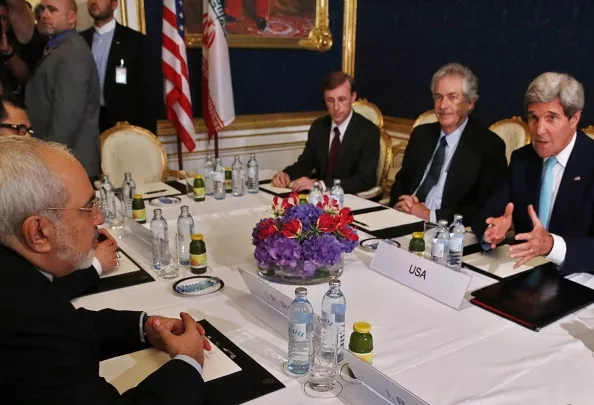Nine foreign policy experts—Nicholas Burns, Chuck Freilich, Orde Kittrie, Martin Malin, Gary Samore, Michael Singh,Ariane Tabatabai, Will Tobey, and Mark Wallace—write on what they believe the extension of P5+1 talks will mean for the future of nuclear negotiations with Iran.
Nicholas Burns, Sultan of Oman Professor of the Practice of International Relations at the Harvard Kennedy School of Government:
As I wrote in the Boston Globe last week, this extension will likely produce “a vocal pushback from a predictable chorus of Washington critics. They will charge that diplomacy has failed and is too soft, weak, and ineffective in dealing with Iran. Some will even argue it is time for Israel or the United States to contemplate military force.
“When that happens, we might recall some fundamental lessons about how diplomacy really works. Diplomacy in war and peace negotiations requires strategy and patience, not an illusory quick fix. Diplomacy is messy, often involving difficult compromises with unseemly governments. But it is also how the vast majority of international crises are actually resolved — through negotiation rather than through the barrel of a gun. Those are worthy lessons to remember after the Iraq and Afghan wars.
“[Secretary] Kerry is the inheritor of a long diplomatic tradition at the State Department. His predecessors — from George Marshall and Dean Acheson to Shultz and Baker — understood that backing diplomacy with the threat of force was smart. But they also knew it was almost always better to exhaust negotiations first before turning to war.
“That’s not bad advice for how we should think about Iran this week. Diplomacy may or may not succeed with Tehran’s mercurial leadership. But…it promises a final lesson that is the most important of all. Diplomacy, at the very least, gives us a chance for peace.”
Chuck Freilich, senior fellow at the Belfer Center and former Deputy National Security Advisor in Israel:
A diplomatic outcome is in the interest of all sides, none more than Israel, and a four month extension of the talks is not significant - if it leads to an acceptable deal and Iran continues to observe the Interim Agreement in the meantime. Unfortunately, a minimally acceptable deal, i.e. one which leaves Iran at least a year away from a military nuclear capability, is looking increasingly unlikely, while the Obama Administration’s desire (desperation?) to reach an agreement may lead it to make dangerous concessions on the extent and duration of the limits imposed on Iran. Part of the problem is that Iran is feeling increasingly confident – the US has not had a credible military option in Iran’s eyes for at least the last year and the sanctions regime is also looking increasingly less threatening to Tehran. Precisely to achieve a diplomatic outcome – it is time to revive a credible American military option, along with a renewed Iranian sense of the drastic economic consequences they will undergo should they fail to make the necessary concessions. It is called coercive diplomacy and it has stood the US very well in the past.
Orde Kittrie, Professor of Law at Arizona State University and Senior Fellow at Foundation for Defense of Democracies:
The Joint Plan of Action (JPA) set a goal of negotiating within a year a comprehensive agreement “that would ensure Iran’s nuclear programme will be exclusively peaceful.” It is not surprising that the negotiators are using the remaining months. However, it is alarming that the parties are reportedly still far apart.
The U.S. is clearly exerting insufficient leverage to bring Iran into compliance with its international nuclear obligations. Iran must understand that it will not succeed in waiting out the West. One major reason for the current stalemate was crystallized by Ayatollah Khamenei’s June 4 speech in which he stood before a banner boasting “America Cannot Do a Damn Thing” and asserted that President Obama’s West Point speech took the military option off the table. In addition to reestablishing the credibility of a military option, the U.S. must make clear that not reaching an agreement will result in sanctions pressure far greater than Iran has faced thus far.
It is not in the U.S. interest to indefinitely extend the JPA. While the JPA moderately hinders Iran’s ability to “break out” at declared facilities, Iran’s ability to “sneak out” by developing a covert nuclear program is largely unhindered by the JPA. Contrary to its legal obligations, Tehran has provided the IAEA with very little insight into how advanced Iran is in its nuclear warhead research and development, and no access to undeclared sites (at which such work may be continuing). In addition, the JPA does not even address Iran’s illicit imports and development of missiles capable of delivering nuclear weapons.

Martin Malin, executive director of the Project on Managing the Atom at the Belfer Center:
The editorial boards of all major US papers—The New York Times¸ The Washington Post, and USA Today, among others—favored an extension of the negotiations with Iran in pursuit of a comprehensive agreement. A recent University of Maryland poll found more than 60 percent of Americans briefed on the negotiations between the Iran and the P5+1 favored a deal that would ease sanctions and allow Iran to continue to enrich uranium under agreed upon constraints. Meanwhile, Senators Menendez and Graham have circulated a letter calling on their colleagues to support a plan that would be certain to kill the negotiations were the administration to adopt their position. In particular they call for an agreement of 20 years in duration and a phasing in of sanctions relief “over a lengthy period of time” to gauge Iranian compliance. The letter warns that “our willingness to consider legislation to provide sanctions relief will be based on resolution of all of these issues in the context of a final agreement.” If an agreement with Iran is inked in the next four months, the Obama administration will need to deliver its end of the bargain or the entire deal will collapse. Much as some in congress may dream it were otherwise, the only deal possible is one based on compromise, not Iranian capitulation. Senators Menedez, Graham, and their colleagues should listen to their constituents on which outcome—deal or no deal—is in the interest of the United States.
Gary Samore, executive director for research at the Belfer Center and former White House coordinator for arms control and weapons of mass destruction:
Of course, the extension makes sense. The P5+1 negotiators believe they have made substantial progress on many issues (though not the central issue of enrichment) and the negotiators think they have a reasonable chance to complete a comprehensive agreement in four additional months. In any event, the interim agreement is performing as expected: the main elements of Iran’s nuclear program are frozen and the overall sanctions regime remains in place. Four additional months of negotiations will not make a significant difference in terms of Iran’s nuclear progress or economic recovery. The bigger challenge for the P5+1 is how to convince Iran to accept significant, long term limits on its enrichment program in exchange for comprehensive relief from nuclear-related sanctions. At this point, it appears unlikely that Supreme Leader Khamenei will accept such constraints unless he is convinced that further extensions are not possible and that rejecting a “best and final” P5+1 proposal on enrichment will result in even more severe economic sanctions and political pressure. But, achieving P5+1 unity on an ultimatum to Iran will be difficult, especially in light of disputes with Russia and China on other issues. In the absence of a comprehensive nuclear deal, the natural inclination of Iran (and some of the P5+1) will be to extend the negotiations past the new deadline because the status quo benefits both sides and avoids increased tensions that would result should the negotiations collapse. If the U.S. wants to avoid being trapped in a series of extensions, it will need to convince Iran and the other P5+1 that it is prepared to walk away from the negotiations and return to the sanctions path should Iran rejects a reasonable face-saving offer on enrichment.
Michael Singh, Lane-Swig Senior Fellow and managing director at The Washington Institute:
There is nothing wrong with continuing to negotiate with Iran, provided doing so is part of a broader and multifaceted policy. A successful outcome to the Iran nuclear crisis will require more than just talking or clever compromises – US negotiators must convince Iranian officials that the alternatives to a deal will be far worse.
The JPOA was a costly and questionable step for the US. It halted the momentum of pressure that had been building on Iran, which will be difficult to regain if talks collapse. It made hard-to-reverse concessions - acquiescence to indefinite uranium enrichment, and acknowledgment that nuclear restrictions on Iran would be temporary, not permanent - in return for Iranian steps that are eminently reversible. Further concessions were made over the following six months by the US – the “legalization” of clandestinely-built facilities at Fordow and Arak, for example – that will not be easily rescinded.
But the biggest misstep the US has made is to have not persuaded Iran of the painful consequences of failing to reach a deal. The credibility of American military threats is at low ebb, and even the threat of further sanctions has been undermined by the successful White House campaign against the Kirk-Menendez bill. Restoring that credibility should be job one for US officials.
If Iran concludes that the alternative to a deal is just more talking – or even that the collapse of diplomacy would herald the end of pressure – then US negotiators will spend the next four months on their heels.
Ariane Tabatabai, Stanton Nuclear Security Fellow an the Belfer Center's International Security Program and Project on Managing the Atom:
The extension of the Joint Plan of Action (JPOA) is neither the best nor the worst outcome for the talks. It does entail a great risk: with more time, the polarization of domestic politics in Iran and the United States can get in the way of concluding a comprehensive deal. Both Tehran and Washington understand this and push for the talks to be resumed in August, much to the Europeans’ dismay, who value their vacation time. Critics in both countries became more vocal as it became apparent that a deal would not be reached prior to the 22 July deadline. In the United States, this has manifested itself with a push for more sanctions on the Hills. In Iran, hard-liners have saw the Supreme Leader’s most recent speech, in which he criticized the P5+1 and supported the negotiators, as a green light to resume their criticism of the Rouhani team.
If a deal is going to be reached, in the weeks to follow, the White House and Rouhani’s team must prepare the grounds at home for it. Both sides must manage expectations. Congress must understand that zero enrichment is not an option. Tehran must make it clear that a maximalist approach is neither realistic nor in Iran’s interest, financially, technically, or politically.
Will Tobey, senior fellow at the Belfer Center and former Deputy Administrator for Defense Nuclear Nonproliferation at the National Nuclear Security Administration:
Nuclear negotiations with Iran have been extended by four months to November 24, 2014. Whether or not this is a constructive move will depend on how that time is spent. Will the parties simply dicker over whether Iran should be allowed to maintain a capability to break out of its treaty commitments and build a nuclear weapon within 2, 6, or 12 months, or will Tehran be expected to demonstrate that it has made a fundamental decision to abandon any nuclear weapons ambitions in return for better relations with advanced economies?
If it is to be the former, the four months will be misspent. If it is to be the latter, what could be accomplished? The P5+1 should test Tehran's willingness to make a strategic decision against nuclear weapons by insisting on resolution of a group of issues that the International Atomic Energy Agency (IAEA) calls "possible military dimensions" of Iran's nuclear program. In 2011, the IAEA reported credible evidence that Iran engaged in a broad range of activities associated with weaponizing fissile material, some of which may be ongoing. In response, Tehran has stonewalled. This must change.
There is no reason to believe that Iran will tell the truth about future nuclear activities when it continues to practice denial and deception about past ones. Over the next four months, the P5+1 should expect substantial progress toward resolution of the "possible military dimensions" issues as a precondition to a final agreement. That would be a deal worth waiting for.
Mark Wallace, CEO of United Against Nuclear Iran and former U.S. Ambassador to the United Nations:
The extension of the JPA is better than a bad deal but the status quo of Iran's current nuclear program is unacceptable.
While the state of the Iranian economy remains in difficulty, Iran's economy has improved more than anticipated in the JPA and the regime's diplomatic isolation has lessened. So far, however, Iran has not shown a willingness to dismantle any of its uranium enrichment capabilities and it continues to research and develop missile delivery systems and advanced centrifuges.
The course of the negotiations has revealed a clear gap on the most important issue -- the number and type of centrifuges. With its current enrichment capacity, Iran's breakout time to produce fissile material for a bomb remains at a few months, but Tehran has been unwilling to consider a reduction in its current capacity. If Iran remains unwilling to dismantle its nuclear infrastructure, forgo an industrial-scale enrichment program and address the ongoing questions about the military dimensions of its nuclear program, there is little potential for a diplomatic resolution.
Iran must come to understand that there will be historic adverse economic consequences if there is a failure to reach a final and acceptable agreement.
By strongly discouraging business interest in re-entering Iran, rigorously enforcing existing and remaining sanctions and agreeing on comprehensive embargo-like sanctions absent a comprehensive deal, the P5+1 will increase chances for a successful negotiation and ensure that the negotiations themselves - currently in a state of diplomatic inertia - do not become the new status quo.
Burns, Nicholas, Chuck Freilich, Orde Kittrie, Martin B. Malin, Gary Samore, Michael K. Singh, Ariane Tabatabai and William H. Tobey. “Expert opinions on the extension of negotiations.” July 22, 2014















